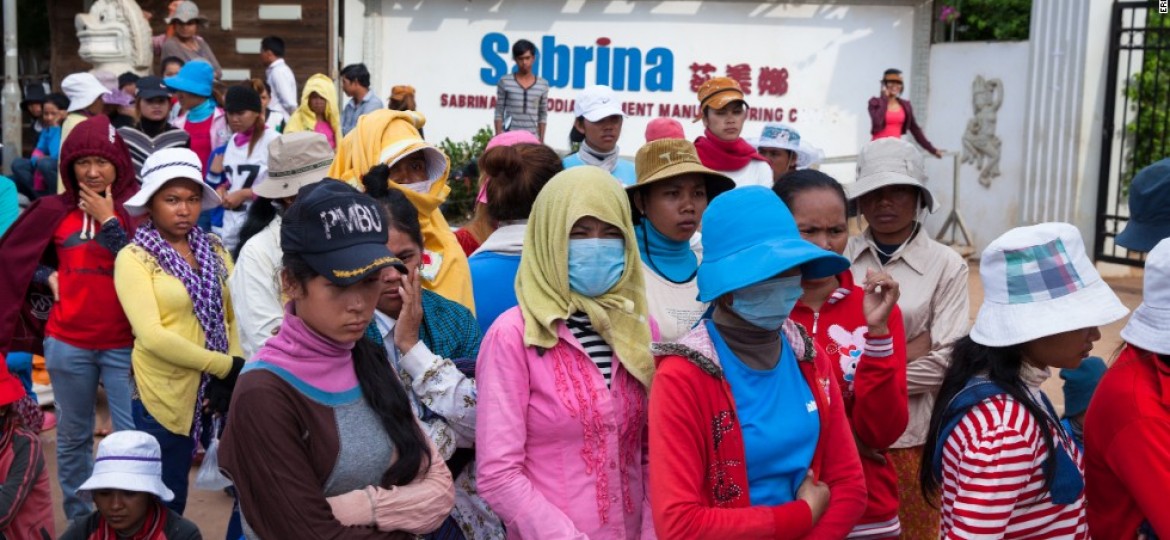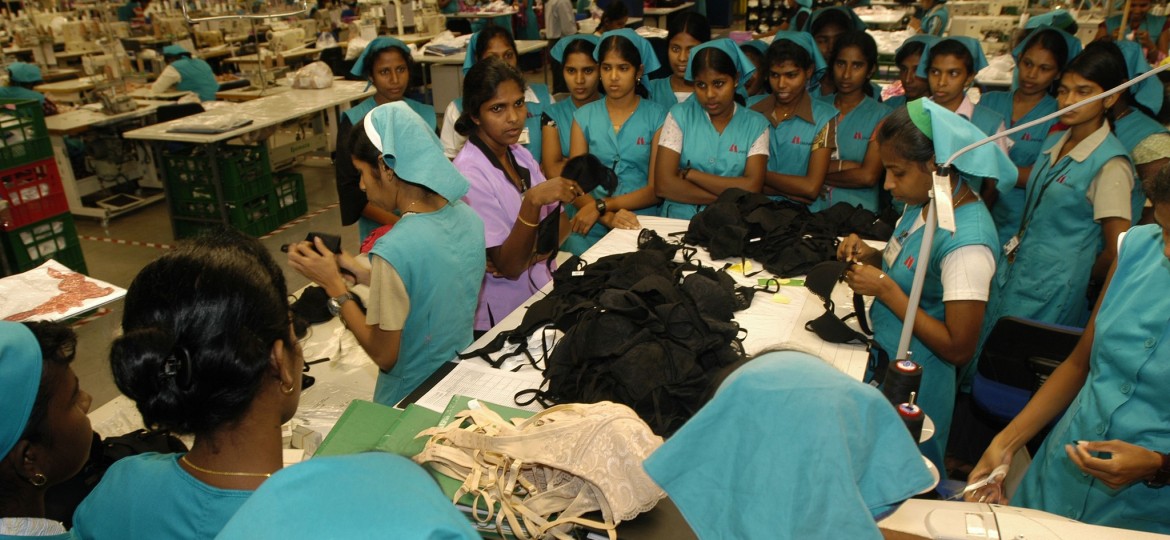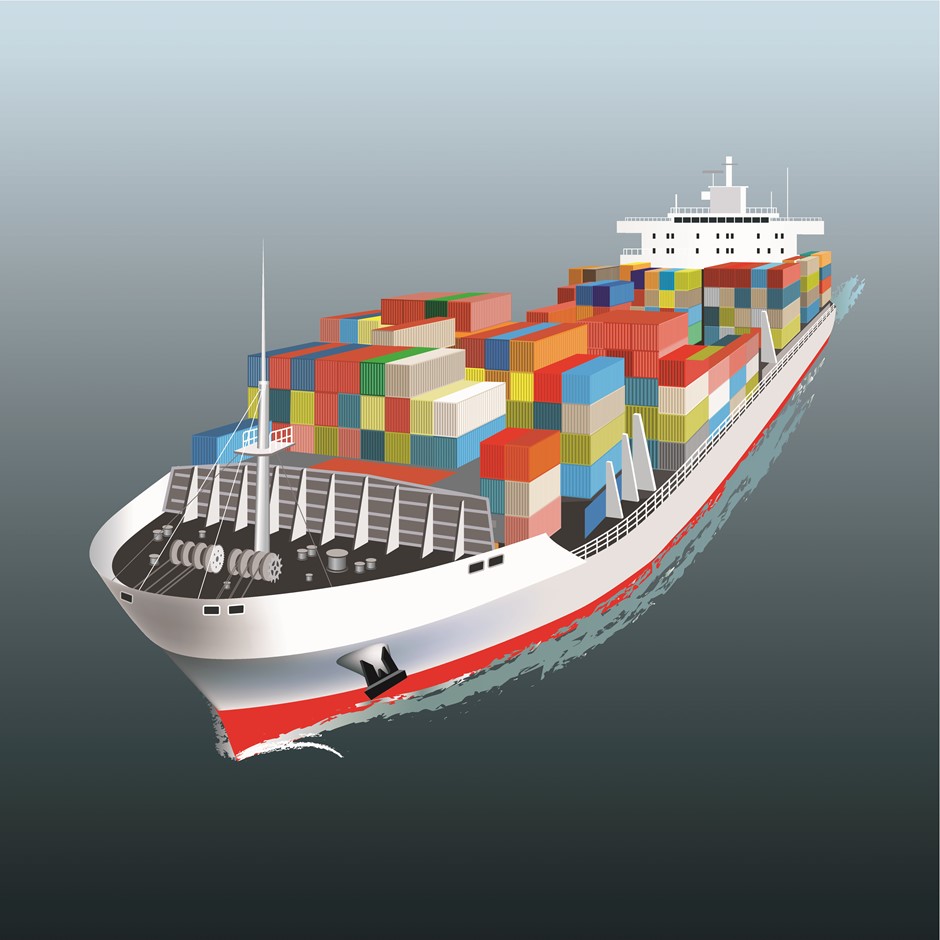Written by Dr Samanthi J. Gunawardana
Juki girls
In Sri Lanka ‘Juki girls’ was the name given to the young women who migrated to the export processing zones to stitch clothes for a living. Referring to the Juki brand of sewing machine, the name also carried with it connotations of immorality. By migrating from their rural homes to urban environments because of poverty and then engaging in modern forms of waged work, these women appeared to defy the ‘respectable’ gendered behaviours expected of them. More than just a nickname, the stigmatised identity of the Juki girl became a means of domination and a site of struggle.
This experience is not unusual. Across the Global South the mass entry of women into export-oriented factory employment in the latter half of the 20th century necessitated their increased mobility and visibility. Many proponents of this shift saw it as empowering women; not only would women earn more money but they would also escape the confines of tradition and of domestic and agrarian work. The World Bank advances this line of argument in its 2016 report Stiches to Riches? Corporate campaigns have also adopted the rhetoric of economic empowerment to reorient public perceptions about the women working in global supply-chains. Contesting this account, initial feminist research by Diane Elson and Ruth Pearson identified the recomposition of gender subordination in which certain forms of patriarchy were broken down but others emerged to take their place. Liberating young women from the authority of their patriarchal households only to subject them to the authority of male bosses was a commonplace way in which this happened.
World Bank: “This sector is a realistic entry point for women, and offers higher wages than agriculture”
Docile feminine labour
The stereotype of docile feminised labour has been advantageous to capital because of the flexibilities it offers. This includes the ability to work longer hours to meet demanding orders from international buyers, as well as the absence of ‘rigidities’ like collective bargaining requirements (women in export processing zones are not typically unionised). But such labour does not exist naturally; capitalists and state elites have had to actively produce it. One way this was achieved was through spatial strategies. For example, in places like Thailand, clothing factories are located near border-towns, and rely on migrant workers from distant regions precisely because they lack the legal rights, social support networks and cultural know-how to protect their interests. Recent suggestions to transform refugee camps into ‘industrial incubators’ shows the ongoing use of such zoning technologies.
Another way of making docile labour has been through the gendered practices and rhetorics of shop-floor life. In Sri Lanka this has taken the form of paternalism, where management acts in loco parentis (i.e. in the place of a parent). This has involved managers liaising with their employees’ family members, targeting parents directly in recruitment drives, providing hostels with tight security arrangements, and replicating paternal relations on the shop floor between managers and workers. The replication of familialism and the subjugation and exploitation it implied for women has been noted across industrialising Asia, revealing the gendered relations underlying the rapid GDP growth.
In harm’s way
Treating female workers as if they were daughters has not made them safe from harm. On the one hand, this has involved forms of violence such as sexual harassment, verbal abuse and physical insecurity travelling to and from work. Much of this goes unreported, especially where women are not just concerned with their immediate safety but also with their reputation and future marriage status.
At its most extreme is the violence of femicide. In Ciudad Juarez, an export processing zone on the US-Mexico border, it is thought that many of the 400 young women who have been murdered or disappeared worked in these factories and were victims of rape. It was thanks only to a legal petition by the mothers of three of these women that the Mexican state was finally held accountable for allowing a climate of discrimination to exist and inadequately investigating these gender-based attacks. Yet as Jacqui True highlights in The Political Economy of Violence Against Women these are not isolated incidents, the product of a particular place, but manifestations of a systematic abuse linked to the restructuring of the global economy. Men’s reaction to the loss of secure employment, the transnational migration of women workers, and the growth of the sex trade around commercial hubs all act as sites of real and potential violence, disciplining women into ascribed roles.
Sites of real and potential violence discipline women into ascribed roles
On the other hand, there is the more subtle form of harm in which people are slowly exhausted. This has been conceptualised in feminist political economy by Shirin Rai et al. as depletion. Here, the physical and emotional energy required to undertake social reproduction – managing the household, caring for others, raising children and so on – is not sufficiently replenished, leading to ill-health. However, my research in a Sri Lankan clothing factory showed that depletion also exists in the sphere of production.
Both men and women in different job categories reported that the one thing they disliked the most about their jobs was overtime. The effects could be seen on their physical and mental health, particularly when compelled to work seven-day weeks with overtime hours every day, or excessive night shifts. I watched as workers who began work at the same time as my factory observations commenced started to lose weight and develop health problems including urinary tract infections (from being unable to take breaks to urinate regulatory) and gastritis and stomach ulcers (from stress/irregular eating patterns). Despite the familial loyalty engendered in the Sri Lankan clothing workforce, employees only last so long before they are ‘finished’, typically just five to six years. Such experiences of routinized illness and burn-out tend not be addressed in the corporate codes of conduct and industry initiatives purporting to produce ‘garments without guilt’, which focus instead on reducing immediate health and safety risks.
Garments without guilt
Listening for voices
In challenging the simplistic exploitation narrative of export-oriented industrialisation, it is equally important not to reify women as passive victims of this process. To this end a vital contribution of feminist methodology has been to ‘reclaim’ the voices of silenced, ignored or marginalised women. This dovetailed with attempts in the sociology of work to move away from totalizing accounts of managerial control by identifying forms of resistance and misbehaviour to show how labour attempted to carve out spaces of relative autonomy, particularly in non-unionised workplaces.
In export processing zones, overt forms of resistance have included wildcat strikes and the formal organization of workers, including in areas where freedom of association has been prohibited or circumvented. Moving beyond the actions and institutions of the orthodox labour movement, Aihwa Ong drew attention to the mass fainting among the newly proletarianised Malay workers in Japanese-owned factories in the 1980s as their response to the culture of capitalism, a “heartfelt protest against the loss of humanity/autonomy in work”. In the 2010s, similar ‘spirit passions’ were reported in the clothing factories of Cambodia.

Garment workers in Cambodia on strike. Source: CNN
In my research site, I found that female workers enacted voice in a variety of ways. Outside of the factory where my observations were conducted, workers organized into trade unions with some women taking on leadership roles. Inside the factory they used the cultural currency of familial relations to their advantage, shaming junior male supervisors who spoke to them in a derogatory way by asking if that was the proper way to speak an ‘older sister’. With management they also used impending factory inspections as leverage, threatening to tell the truth about working conditions to the auditors if their request for leave of absence on a national holiday was not honoured. Finally, there was informal sharing of information among the more activist employees about their rights and entitlements which strengthened their ability to speak with conviction on behalf of their colleagues. While employees would engage with the management-controlled workers’ council too, it is these other practices that give the best sense of their political agency – and the most effective repudiation of the artifice of ‘docile feminine labour’.
Clothing Resources
Caraway, T. L. (2007) Assembling Women: The Feminization of Global Manufacturing. Ithaca, NY: Cornell University Press.
Elias, J. and Gunawardana, S. J. eds. (2013) Global Political Economy of the Household in Asia. Basingstoke, UK: Palgrave MacMillan.
Lynch, C. (2007) Juki Girls, Good Girls: Gender and Cultural Politics in Sri Lanka’s Global Garment Industry. Ithaca, NY: Cornell University Press.
Gunawardana, S. J. (2014) ‘Reframing Employee Voice: A Case Study in Sri Lanka’s Export Processing Zones’, Work, Employment and Society, 28:3, pp. 452-468
Standing, G. (1999), ‘Global Feminization through Flexible Labor: A Theme Revisited’, World Development, 27: 3, 583-602.
Elson, D. and R. Pearson (1981) ‘“Nimble Fingers Make Cheap Workers”: An Analysis of Women’s Employment in Third World Export Manufacturing’, Feminist Review, 7: 1, 87-107.
Cheney, C. (2016). ‘What will move the needle for worker well-being in the fashion industry?’, Devex Impact, 15 November 2016.
Goger, A. and Ruwanpura, K. N. (2016). ‘Living Wages: Recurring Problems of Ethical Fashion in Sri Lanka?’, Discover Society, 5 July 2016.
Stotz, L. and Kane, G. (2015). Facts on the Global Garment Industry, Clean Clothes Campaign, 28 April 2015.



